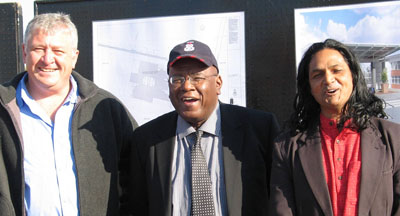 |
Pictured at the sod-turning ceremony are, from the left: Mr Nico Janse van Rensburg (Manager: Physical Planning), Prof. Jonathan Jansen (Rector and Vice-Chancellor of the UFS) and Prof. Dennis Francis (Dean: Faculty of Education).
Photo: Ula van Zyl |
Since 2009, the University of the Free State (UFS) has already rolled out building projects to the value of R220 million on its Main and Qwaqwa Campuses.
Some of these projects include a new building for Education Training for the Faculty of Education, which will be erected at a cost of R21 million on the Main Campus opposite the UFS-Sasol Library. The sod-turning ceremony of the centre took place last week.
Prof. Jonathan Jansen, Rector and Vice-Chancellor of the UFS, turned the first sod and a tree was also planted at the future entrance of this impressive building. “I am impressed with the eco-friendly design of the building and what the project promises for the future of the faculty and the UFS. It is important that the UFS continues to expand and improve,” he said.
The building, which will primarily be used for the training of Mathematics and Science teachers in the foundational phase, will amongst others boast three classrooms with seating for 100 students each, an auditorium that can seat 225 students and an office block. The auditorium will also be used as a classroom in the traditional African context of open-air teaching. The building has been designed to save water and power efficiently and will be completed by the end of 2011.
Other building projects that have been rolled out on the Main Campus this year include a building consisting of lecturing halls as well as offices for the Faculty of Health Sciences, a new skills laboratory, new laboratories, etc., at the Biotechnology Building, the renovation of the Stef Coetzee Building, die upgrading of various lecturing halls, the upgrading of service workers’ quarters, as well as the installation of computer rooms in virtually all the hostels.
Various other projects are in the pipeline, for example, extensions to the building in which the Department of Architecture is housed. At the Qwaqwa Campus, a new building for the Faculty of Education is under construction, laboratories are being renovated and new hostels for 200 students are being built.
Media Release:
Lacea Loader
Director: Strategic Communication (actg)
Tel: 051 401 2584
Cell: 083 645 2454
E-mail: loaderl@ufs.ac.za
26 July 2010